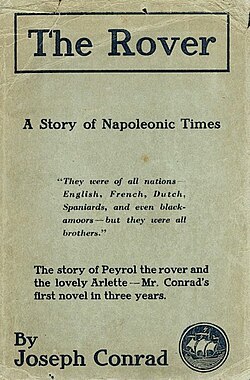Plot summary
The story takes place in the south of France, against the backdrop of the French Revolution, Napoleon's rise to power, and the French-English rivalry in the Mediterranean. Peyrol (a master-gunner in the French republican navy, pirate, and for nearly fifty years "rover of the outer seas") attempts to find refuge in an isolated farmhouse (Escampobar) on the Giens Peninsula near Hyères.
The story is about Peyrol's attempt at withdrawal from an action- and blood-filled life; his involvement with the pariahs of Escampobar; the struggle for his identity and allegiance, which is resolved in his last voyage.
The plotline involving Escampobar is a retelling of the tale of Acis and Galatea. The young maiden, Arlette, is made to marry the murderer of her parents, Scevola; Scevola desires to kill Peyrol after mistaking him for Réal, his rival in love for Arlette. [2]
This page is based on this
Wikipedia article Text is available under the
CC BY-SA 4.0 license; additional terms may apply.
Images, videos and audio are available under their respective licenses.
